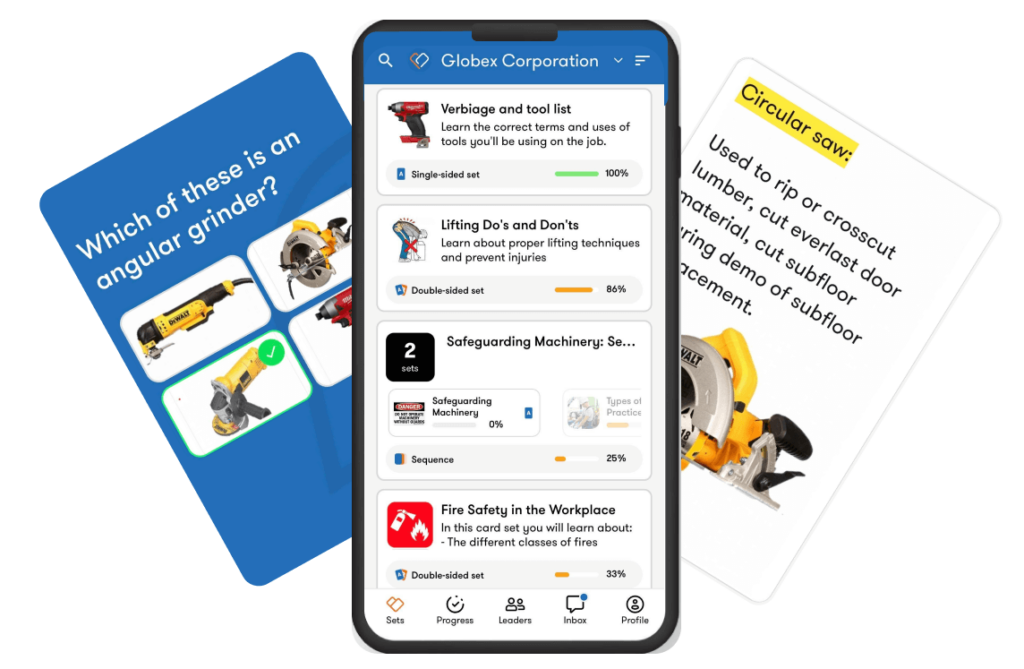No matter how well you’ve documented your company processes, a hidden treasure known as tribal knowledge quietly shapes how things are done. Much like ancient civilizations that passed down their stories and wisdom through oral history, today’s companies are filled with unwritten secrets and skills.
This treasure trove of knowledge that’s embedded in the experiences and insights of staff can be the key to unlocking the best moves in your business. From the way to work around a machine’s quirks, to the mental list of alternative ingredient substitutions a chef can make on a dish, the key is in the resourcefulness of your people.
But just as the tales of old were at risk of being lost with time, tribal knowledge faces the same challenge. Knowledge gaps and inconsistencies can occur when key employees leave, or teams fail to communicate effectively.
Understanding and harnessing this knowledge is key to preserving it, and turning it into a powerful tool for your business. Let’s dive in to understand what is tribal knowledge, and what role it plays in the modern corporate landscape.
- What is tribal knowledge?
- The challenges of tribal knowledge, and solutions for effective management
- What does tribal knowledge mean for your business?
- The impact of tribal knowledge
- Benefits of properly managing tribal knowledge
- Strategies for capturing and leveraging tribal knowledge in the workplace
- FAQs
- Key takeaways
What is tribal knowledge?
At its core, tribal knowledge definition is the sum of all unwritten skills, solutions, and practices that are informally passed among employees within an organization. The depth and variety of tribal knowledge exists beyond formal training and documentation in all industries.
Consider—
- A nurse in the healthcare industry who has the softest hand when it comes to drawing blood.
- A retail manager who knows the perfect product placement to maximize sales during the holiday season.
- A waitress in the food and beverage industry who knows that if you add a little syrup to a chocolate milkshake, it will immediately taste twice as good.
- A senior dev in a tech company that knows how to work around the legacy code (and probably because they wrote it and is the only person who knows it in its entirety).
While seemingly small, it’s this knowledge that adds up to form your company’s operational efficiency, innovation, and customer satisfaction. It’s a rich resource that, when effectively managed, can lead to unparalleled problem-solving.
However, its intangible nature also makes it susceptible to being lost without effective ways to record and share knowledge, highlighting the need for strategic knowledge management.
The challenges of tribal knowledge, and solutions for effective management
While tribal knowledge is a powerful asset, it also presents unique challenges if not properly managed. Perhaps this biggest challenge with tribal knowledge is the risk of losing critical information when experienced employees leave the company. Without a system to capture their wisdom, invaluable insights can disappear, leaving significant gaps.
Challenges:
- Risk of knowledge loss: When key employees leave, there can be a significant loss of specialized knowledge.
- Inconsistencies and miscommunications: Relying solely on informal knowledge transfer can affect quality and performance. Much like a game of telephone, the result can lead to inconsistency and miscommunication.
- Difficulty onboarding new employees: When well-documented processes and knowledge are lacking, new hires might struggle.
Solutions:
- Implement knowledge-sharing platforms: Using knowledge-sharing tools and platforms can help record and share tribal knowledge throughout your organization.
- Create a culture of documentation: Set up a routine for staff to document their knowledge to help preserve critical information.
- Mentorship and training programs: Pair new hires with experienced mentors to ease the transfer of tribal knowledge. Doing this can create a smoother onboarding process.
By addressing these challenges with strategic solutions, organizations can ensure that their tribal knowledge is preserved, accessible, and continues to grow.
What does tribal knowledge mean for your business?
Balancing the value of your team’s knowledge and how to record it matters. Creating a culture where sharing knowledge is normal, ensuring important information is written down, and using technology to keep track of what everyone knows can help. This way, you keep your business running smoothly, even when people come and go.
The impact of tribal knowledge
Tribal knowledge can be a double-edged sword for businesses. It’s the special know-how and shortcuts that employees have learned over time. This knowledge can give your company an edge over others, making things run smoother and faster, while creating a unique way of doing things.
However, relying too much on tribal knowledge has its downsides. If key team members leave, they take their priceless knowledge with them. This can lead to mistakes and slow-downs. And when only a few people know how to do certain things, it can block new ideas, and make it hard to keep up with rules and safety measures.
Benefits of properly managing tribal knowledge
When you get a handle on tribal knowledge, your business can really shine. Here’s how:
- Standardization and quality improvement
Think of tribal knowledge like a secret recipe. By writing it down, everyone can make the dish the same tasty way every time, reducing mistakes and making sure everything’s top-notch. - Operational efficiency
It’s like sorting through your toolbox, keeping what you need and tossing what you don’t. When you identify and document the best ways to work, you cut out the fluff and keep your operations lean and on point. - Regulatory compliance
Maintaining records not only keeps your team on track but also keeps you in the clear with the law. It’s like having a map that shows you how to avoid the no-go zones, preventing costly fines and keeping your reputation intact.
Make tribal knowledge easily accessible with a powerful mobile app

Strategies for capturing and leveraging tribal knowledge in the workplace
1. Address common obstacles
One of the first steps in harnessing tribal knowledge is to tackle the barriers head-on. Employees might hesitate to share their knowledge, fearing it might affect their job security or bargaining power.
It’s crucial to communicate the collective benefits of sharing knowledge and reassure individuals that their contributions are valued, and not threatening their positions. Assuming that the employee isn’t cutting corners that could cause harm to the business, you should reward people for finding more efficient ways to do things, and for passing this knowledge along to their team.
2. Give people the chance to share their knowledge
Engage in process improvement events. Workshops or seminars can help identify key areas where tribal knowledge impacts operations the most.
Implement a culture of collaboration and knowledge sharing. Foster an environment where sharing information is rewarded, and seen as contributing to the company’s success.
3. Cross-train employees
Training your staff across multiple jobs and departments, also known as cross training, can spread critical knowledge across the team, reducing dependency on any single person. However, this alone isn’t enough. Documentation is key to ensuring that the nuances of tasks are not lost, and can be referred to when needed.
4. Pair new hires with senior employees
Aside from helping people get to know each other, pairing senior employees with new hires is a great way to open the door to knowledge sharing. The reality is that it’s hard to get tribal knowledge written down and formally documented. The next best thing you can do is spread that info among more team members.
Tribal knowledge is most commonly passed around in an informal setting, or while directly on the job. That’s why it’s valuable to pair junior employees with more senior ones— your long standing team members won’t remember off the top of their heads every tip and trick they’ve amassed, but when they’re directly on the job, these pieces of info are bound to come up.
Tribal knowledge in the workplace is informal and spontaneous by nature. But by giving people the opportunity to organically share their know-how, you increase the chances that more than one person in your company will have this special knowledge stored away somewhere.
FAQs
What is the politically correct way to say tribal knowledge?
The term “tribal knowledge” can be sensitively perceived due to its cultural implications. An alternative, more neutral term is “institutional knowledge,” which conveys the idea of collective wisdom within an organization, without cultural connotations.
What’s another term for tribal knowledge?
Besides “institutional knowledge,” another term used is “collective wisdom.” This phrase emphasizes the shared insights and experiences that contribute to an organization’s unique operational approach.
What is the difference between tribal knowledge and tacit knowledge?
Tribal knowledge refers specifically to the collective insights and practices shared within an organization. Tacit knowledge is broader, encompassing all the unspoken, unwritten knowledge individuals possess. Tacit knowledge can be part of tribal knowledge, but also includes personal skills and experiences not necessarily shared.
What are the problems with tribal knowledge?
Tribal knowledge, the informal information shared among team members, often leads to issues like inefficiency, inconsistency, and challenges in standardizing work practices.
When key employees depart without transferring their knowledge, it not only risks knowledge loss but can also waste resources and cause operational issues.
To combat these issues, documenting processes to establish a unified knowledge base is crucial, ensuring all employees have immediate access to what they need to know.
Bridge the learning gap with a mobile platform
At its best, tribal knowledge offers your company a unique advantage over the competition. At its worst, it can create a culture of gate-keeping, forming a divide between senior members and new hires. That’s why it’s critical that you find ways to organically harvest tribal knowledge, and make it an asset in your company— not a liability.
Because tribal knowledge tends to get passed from person to person, streamlining this process can be a huge challenge. That’s why one of the best places to gather and house this information is on a mobile training app. Mobile training apps make information accessible to employees directly from their smartphones, so they don’t need to open up a laptop every time they need to recall a piece of info. And by deploying such an app across your company, you’ll foster a culture of knowledge sharing and preservation, giving everyone access to the info they need to perform at their best.
Key takeaways
- Just like oral history in ancient communities, tribal knowledge in modern companies shapes practices and innovations through unwritten secrets and skills.
- Effective management and documentation are essential to preserve tribal knowledge.
- While you’ll never be able to document every piece of tribal knowledge, you should give employees the chance to share how they carry out their tasks. This increases the likeness of this unwritten information being shared among multiple team members, instead of reserved to a single person.
- Risks like knowledge loss and inconsistency can be mitigated with knowledge-sharing platforms, a culture of documentation, and mentorship programs.
Make tribal knowledge conveniently accessible with a mobile training app



